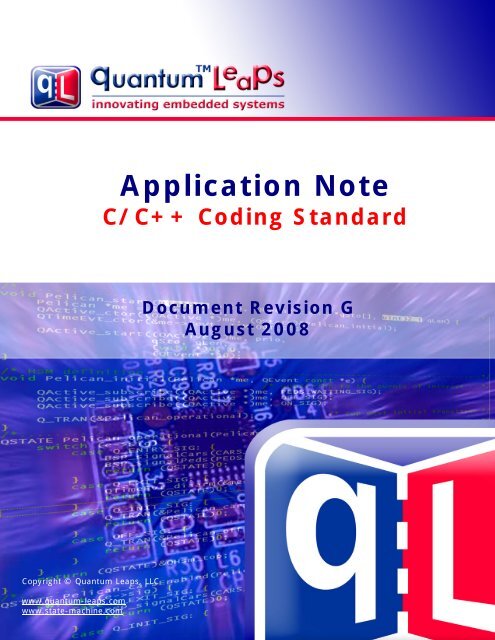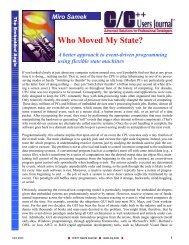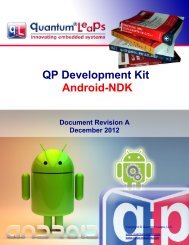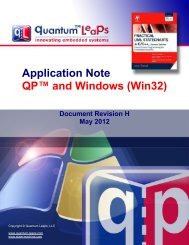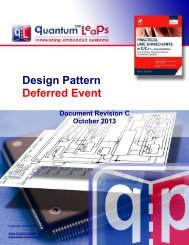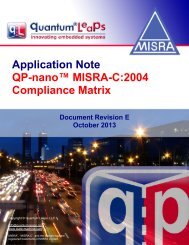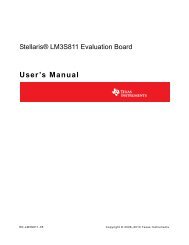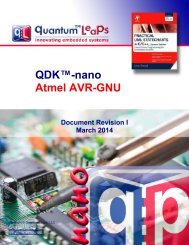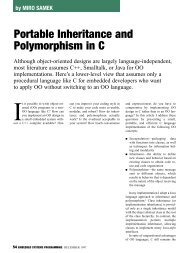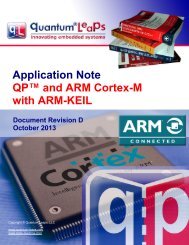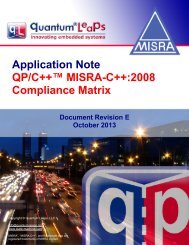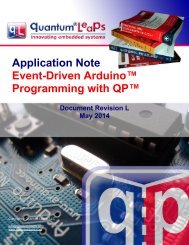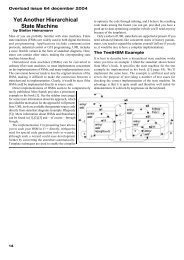QL C/C++ Coding Standard - Quantum Leaps
QL C/C++ Coding Standard - Quantum Leaps
QL C/C++ Coding Standard - Quantum Leaps
Create successful ePaper yourself
Turn your PDF publications into a flip-book with our unique Google optimized e-Paper software.
Application Note<br />
C/<strong>C++</strong> <strong>Coding</strong> <strong>Standard</strong><br />
Document Revision G<br />
August 2008<br />
Copyright © <strong>Quantum</strong> <strong>Leaps</strong>, LLC<br />
www.quantum-leaps.com<br />
www.state-machine.com
Table of Contents<br />
1 Goals............................................................................................................... 1<br />
2 General Rules.................................................................................................. 1<br />
3 C/<strong>C++</strong> Layout ................................................................................................. 2<br />
3.1 Expressions ..................................................................................................... 2<br />
3.2 Indentation ...................................................................................................... 3<br />
3.2.1 The if Statement......................................................................................... 4<br />
3.2.2 The for Statement....................................................................................... 4<br />
3.2.3 The while Statement ................................................................................... 4<br />
3.2.4 The do..while Statement ............................................................................. 4<br />
3.2.5 The switch Statement ................................................................................. 5<br />
3.2.6 Function Declarations .................................................................................. 5<br />
3.2.7 <strong>C++</strong> Class Declaration................................................................................. 5<br />
3.3 Commenting .................................................................................................... 6<br />
3.4 Module Layout.................................................................................................. 7<br />
3.4.1 Header Comment........................................................................................ 7<br />
3.4.2 Included Header Files .................................................................................. 7<br />
3.4.3 Public Section Specification .......................................................................... 7<br />
3.4.4 Package Section Specification ....................................................................... 7<br />
3.4.5 Local Section Specification ........................................................................... 8<br />
3.4.6 Implementation Section............................................................................... 8<br />
3.4.7 Notes Section............................................................................................. 8<br />
4 Exact-Width Integer Types ............................................................................. 9<br />
5 Names........................................................................................................... 10<br />
5.1 Reserved Names............................................................................................. 10<br />
5.2 Naming Conventions ....................................................................................... 10<br />
6 Object Oriented Programming in C................................................................ 12<br />
6.1 Encapsulation................................................................................................. 12<br />
6.2 Inheritance .................................................................................................... 13<br />
7 Design by Contract........................................................................................ 14<br />
8 C/<strong>C++</strong> Codesize Metrics ............................................................................... 14<br />
9 Related Documents and References .............................................................. 15<br />
10 Contact Information...................................................................................... 16<br />
Copyright © 2002-2008 quantum L e aps, LLC. All Rights Reserved.<br />
Permission is granted to copy, distribute and/or modify this document under the terms of the GNU Free<br />
Documentation License, Version 1.2 or any later version published by the Free Software Foundation; with<br />
this copyright notice being preserved. A copy of the license is available from the Free Software Foundation<br />
at: www.gnu.org/copyleft/fdl.html.<br />
Copyright © <strong>Quantum</strong> <strong>Leaps</strong>, LLC. All Rights Reserved.<br />
i
1 Goals<br />
Adopting a reasonable coding standard is perhaps the first and easiest step towards improving<br />
quality of code, increasing maturity level, or achieving any code certification. The following coding<br />
guidelines are intended to improve code portability, readability, uniformity and maintainability for<br />
software. The primary objective of this <strong>Coding</strong> <strong>Standard</strong> is to boost software productivity and lower<br />
maintenance cost by promoting commonality and avoiding misinterpretations and guessing. The<br />
<strong>Standard</strong> is designed mostly with embedded systems in mind and, where applicable, recommends<br />
rules established by Motor Industry Software Reliability Association (MISRA) [MISRA 98].<br />
2 General Rules<br />
The rules in this category are intended for better source code portability and consistent code rendering<br />
on a wide variety of devices and platforms like: different screens, printers, and various code<br />
editors working on different computer platforms. These rules should apply to all ASCII documents,<br />
not only strictly to code.<br />
• No tabs are allowed in the source code because tabs are rendered differently on different devices<br />
and bring only insignificant memory savings. Preferably, tabs should be disabled at the<br />
editor level. At the very least, they should be replaced by spaces before saving the file.<br />
• Source code lines should never exceed 78 columns, and not even “white characters” (spaces<br />
or tabs) are allowed past the 78th column. Limiting the column-count is intended to enable<br />
side-by side editing and side-by-side differencing of code without horizontal scrolling of the<br />
text. (As all GUI usability tests agree, horizontal scrolling of text is always a bad idea.) In practice,<br />
the source code is very often copied-and-pasted and then modified, rather than created<br />
from scratch. For this style of editing, it’s very advantageous to see simultaneously and sideby-side<br />
both the original and the modified copy. Also, differencing the code is a routinely performed<br />
action of any VCS (Version Control System) whenever you check-in or merge the code.<br />
Limiting the column count allows to use the horizontal screen real estate much more efficiently<br />
for side-by-side-oriented text windows instead of much less convenient and error-prone top-tobottom<br />
differencing.<br />
• All source code should consistently use only one end-of-line convention. For improved portability,<br />
this <strong>Standard</strong> recommends consistent use of the Unix end-of-line convention, with<br />
only one LF character (0x0A) terminating each line. The DOS/Windows end-of-line convention<br />
with CR, LF character pair (0x0D, 0x0A) terminating each line is not recommended because it<br />
causes compilation problems on Unix-like systems, such as Linux. (Specifically, the C preprocessor<br />
doesn’t correctly parse the multi-line macros.) On the other hand, most<br />
DOS/Windows compilers seem to tolerate the Unix EOL convention without problems.<br />
• Highly portable source code intended for wide use on different platforms should be limited to<br />
the old DOS 8.3 convention for file and directory names. This restriction is imposed to allow<br />
using older tools like embedded cross-compilers, linkers etc. still working in the DOS environment.<br />
The 8.3 file name convention seems to be the least common denominator supported by<br />
all computer platforms.<br />
• All source code should use only lower-case names for files and directories. This restriction<br />
promotes portability, because it eliminates the possibility of inconsistencies in the names. For<br />
example, a Unix-like system might not include correctly a file “qevent.h” when the file name<br />
is actually “Qevent.h”.<br />
Copyright © <strong>Quantum</strong> <strong>Leaps</strong>, LLC. All Rights Reserved. 1 of 16
<strong>Quantum</strong> <strong>Leaps</strong><br />
C/<strong>C++</strong> <strong>Coding</strong> <strong>Standard</strong><br />
3 C/<strong>C++</strong> Layout<br />
3.1 Expressions<br />
The following binary operators are written with no space around them:<br />
-> Structure pointer operator me->foo<br />
. Structure member operator s.foo<br />
[] Array subscripting a[i]<br />
() Function call foo(x, y, z)<br />
Parentheses after function names have no space before them. A space should be introduced after<br />
each comma to separate each actual argument in a function. Expressions within parentheses are<br />
written with no space after the opening parenthesis and no space before the closing parenthesis.<br />
Terminating semicolons should follow the instructions immediately with no space(s) before them:<br />
strncat(t, s, n);<br />
The unary operators are written with no spaces between them and their operands:<br />
!p ~b ++i j-- (void *)ptr *p &x -k<br />
The binary operators are preceded and followed by one (1) space, as is the ternary operator:<br />
c1 == c2 x + y i += 2 n > 0 ? n : -n<br />
The keywords if, while, for, switch, and return are followed by one (1) space:<br />
return foo(me->x) + y;<br />
In case of compound expressions, parenthesizing should be used whenever the precedence is not<br />
"obvious". In general, over parenthesizing is recommended to remove any doubt and guessing. In<br />
the extreme case of MISRA-C Rules [MISRA 98], no dependence should be placed on C’s operator<br />
precedence whatsoever (MISRA-C rule 47), so every expression must be parenthesized. In addition,<br />
MISRA rules require that the operands of && and || shall be primary expressions (MISRA-C<br />
rule 34).<br />
Following are examples of parenthesizing consistent with the strict MISRA-C rules:<br />
(a < b) && (b < c) /* operands of && are primary expressions (MISRA rule 34) */<br />
x = (a * b) + c; /* don’t rely on precedence of ‘*’over ‘+’ */<br />
Copyright © <strong>Quantum</strong> <strong>Leaps</strong>, LLC. All Rights Reserved. 2 of 16
<strong>Quantum</strong> <strong>Leaps</strong><br />
C/<strong>C++</strong> <strong>Coding</strong> <strong>Standard</strong><br />
3.2 Indentation<br />
All indentations must be exactly four (4) spaces to indicate scope. All declarators and control<br />
statements are formatted according to the following "line saver" template:<br />
{<br />
;<br />
. . .<br />
}<br />
where the may be one of the following:<br />
• function declarator<br />
• structure/class declarator<br />
• enumeration<br />
• structure/array initializer<br />
• control statement (if, while, for, switch, case, do)<br />
The <strong>Standard</strong> requires that the statement following any of the keywords (if, else, while, for,<br />
switch, case, do) must be compound, that is, use of braces is obligatory. This requirement corresponds<br />
to MISRA-C rule 59. Although not strictly required by the C/<strong>C++</strong> syntax, this rule is imposed<br />
to remove any doubts as far as statement nesting is concerned, and to allow easy addition/removal<br />
of nested statements with minimal differences showing when differencing the code<br />
using a VCS. For example, consider adding a statement to a while loop:<br />
/* not a compound statement—not recommended */ /* compound statement-recommended */<br />
while (i > 0) while (i > 0) {<br />
*t++ = *s++;<br />
*t++ = *s++;<br />
}<br />
after modification:<br />
/* not a compound statement—not recommended */ /* compound statement-recommended */<br />
while (i > 0) while (i > 0) {<br />
*t++ = *s++;<br />
*t++ = *s++;<br />
--i;<br />
--i;<br />
}<br />
With the not-compound statement case you either make a mistake by forgetting the braces (although<br />
the indentation clearly indicates the intention), or you must introduce the braces, which<br />
then show as a big difference when merging the code or checking it into the VCS.<br />
If the is so complex that it cannot fit in one line, then it should<br />
be formatted in the following manner:<br />
<br />
<br />
<br />
{<br />
;<br />
. . .<br />
}<br />
The arguments of a declarator should be split into separate lines leaving separating comma ‘,’ as<br />
the last character in the line. The condition of the control statement should be split into separate<br />
Copyright © <strong>Quantum</strong> <strong>Leaps</strong>, LLC. All Rights Reserved. 3 of 16
<strong>Quantum</strong> <strong>Leaps</strong><br />
C/<strong>C++</strong> <strong>Coding</strong> <strong>Standard</strong><br />
lines starting new lines with a binary operator. This formatting intends to avoid confusing continuation<br />
of the control statement with its body. For example:<br />
if (!decodeData(&s, &dataType,<br />
&format, &version)<br />
&& format != 2 /* expecting only format 2 */<br />
&& version != 1) /* expecting only version 1 */<br />
{<br />
log("data corrupt");<br />
}<br />
3.2.1 The if Statement<br />
if (x < 0) {<br />
z = 25;<br />
}<br />
if (--cnt == 0) {<br />
z = 10;<br />
cnt = 1000;<br />
}<br />
else {<br />
z = 200;<br />
}<br />
if (x > y) {<br />
foo(x, y);<br />
z = 100;<br />
}<br />
else {<br />
if (y < x) {<br />
foo(y, x);<br />
z = 200;<br />
}<br />
else {<br />
x = 0;<br />
y = 0;<br />
}<br />
}<br />
3.2.2 The for Statement<br />
for (i = 0; i < MAX_ITER; ++i) {<br />
*p2++ = *p1++;<br />
xx[i] = 0;<br />
}<br />
3.2.3 The while Statement<br />
while (--ctr != 0) {<br />
*p2++ = *p1++;<br />
*p3++ = 0;<br />
}<br />
3.2.4 The do..while Statement<br />
do {<br />
--ctr;<br />
*p2++ = *p1++;<br />
} while (cnt > 0);<br />
Copyright © <strong>Quantum</strong> <strong>Leaps</strong>, LLC. All Rights Reserved. 4 of 16
<strong>Quantum</strong> <strong>Leaps</strong><br />
C/<strong>C++</strong> <strong>Coding</strong> <strong>Standard</strong><br />
3.2.5 The switch Statement<br />
switch (key) {<br />
case KEY_BS: {<br />
if (--me->ctr == 0) {<br />
me->ctr = PERIOD;<br />
}<br />
break;<br />
}<br />
case KEY_CR: {<br />
++me->crCtr;<br />
/* intentionally fall through */<br />
}<br />
case KEY_LF: {<br />
++p;<br />
break;<br />
}<br />
default: {<br />
ASSERT(0); /* should never be reached */<br />
break;<br />
}<br />
}<br />
Any fall though cases must be documented with comments confirming intentional fall through<br />
rather then an omission.<br />
3.2.6 Function Declarations<br />
void clrBuf(char *buf[], int len) {<br />
char *b = &buf[0];<br />
while (len-- != 0) {<br />
*b++ = '\0';<br />
}<br />
}<br />
3.2.7 <strong>C++</strong> Class Declaration<br />
class Foo : public Bar {<br />
public:<br />
Foo(int8_t x, int16_t y, int32_t z)<br />
: Bar(x, y), m_z(z)<br />
{}<br />
virtual ~Foo();<br />
virtual int32_t doSomething(int8_t x);<br />
// ctor<br />
// xtor<br />
// method<br />
protected:<br />
virtual void *bar();<br />
private:<br />
friend class Tar;<br />
friend void *fxyz(int16_t i);<br />
};<br />
int8_t m_x;<br />
uint16_t m_y;<br />
int32_t m_z;<br />
Copyright © <strong>Quantum</strong> <strong>Leaps</strong>, LLC. All Rights Reserved. 5 of 16
<strong>Quantum</strong> <strong>Leaps</strong><br />
C/<strong>C++</strong> <strong>Coding</strong> <strong>Standard</strong><br />
3.3 Commenting<br />
Code implements an algorithm; the comments communicate the code’s operation to yourself and<br />
others. Adequate comments allow you to understand the system’s operation without having to read<br />
the code itself.<br />
Comments can be generally divided into three categories:<br />
• Elaborate high-level comments for major software components like: modules, classes, and<br />
exported APIs.<br />
• Brief, fine granularity comments explaining algorithmic details of performed operations.<br />
• References and notes attached to code in form of comments.<br />
Comments in the first category explain high level interfaces and the code structure. With help of<br />
automatic documentation generating tools like JavaDoc for Java or DO<strong>C++</strong> for C/<strong>C++</strong>, these comments<br />
can easily be turned into online (HTML) documentation. The <strong>Standard</strong> does not require that<br />
every top-level comment be verified in view of converting it into on-line documentation. However,<br />
adhering to the following simple rules will make such automatic documentation extraction much<br />
easier, if we want to take advantage of it:<br />
Top-level comments should always come before the commented object.<br />
No right-edge in comment boxes should be used, because keeping the right-edge of the box<br />
aligned is counterproductive:<br />
/* INCORRECT: */<br />
/*****************************************************************************<br />
* this is class Foo *<br />
* . . . *<br />
*****************************************************************************/<br />
class Foo {<br />
...<br />
};<br />
/* CORRECT: */<br />
//////////////////////////////////////////////////////////////////////////////<br />
// class Foo performs the following<br />
// ...<br />
//<br />
class Foo {<br />
...<br />
};<br />
Comments in the second category are typically low-level, algorithmic details. They should be<br />
placed as close to the pertaining code as possible, preferably in the same line. Although close to<br />
the code, the comments should be visually separated from code as much as possible by rightjustifying<br />
them. Following section gives examples of aligning such comments:<br />
References and notes should be attached in form of the "notes" comment at the end of the module<br />
as shown in the next section describing the module layout.<br />
Write comments in clear English. Use simple sentences: noun, verb, object. Use active voice. Be<br />
complete. Good comments capture everything important about the problem at hand. Ideally, it<br />
should be possible to get a sense of the system’s operation by reading only the comments.<br />
For portability, never use <strong>C++</strong> comments (//) in C, although many C compilers recognize <strong>C++</strong><br />
comments. (But the point is that some don’t!). Conversely, avoid using C comments (/*..*/) in<br />
<strong>C++</strong>.<br />
Copyright © <strong>Quantum</strong> <strong>Leaps</strong>, LLC. All Rights Reserved. 6 of 16
<strong>Quantum</strong> <strong>Leaps</strong><br />
C/<strong>C++</strong> <strong>Coding</strong> <strong>Standard</strong><br />
3.4 Module Layout<br />
The module is organized as follows:<br />
• Header comment block<br />
• #include statements<br />
• Public Section Specification<br />
• Package Section Specification<br />
• Local Section Specification<br />
• Implementation<br />
• Notes<br />
3.4.1 Header Comment<br />
Each module starts with a header comment in the following format:<br />
/*****************************************************************************<br />
* Product: . .<br />
* Version: . .<br />
* Released: Dec 27 2003<br />
* Updated: Dec 17 2004<br />
*<br />
* Copyright (C) 2002-2004 <strong>Quantum</strong> <strong>Leaps</strong>. All rights reserved.<br />
*<br />
* (if any)<br />
*<br />
* <br />
*****************************************************************************/<br />
3.4.2 Included Header Files<br />
#include "rtk.h" /* Real-Time Kernel */<br />
#include "qassert.h" /* embedded-systems-friendly assertions */<br />
3.4.3 Public Section Specification<br />
Definitions of public (global) variables should appear at the top of the module:<br />
/* Public-scope objects ---------------------------------------------------*/<br />
QActive *UI_Mgr; /* pointer to the User Interface Manager active object */<br />
. . .<br />
3.4.4 Package Section Specification<br />
The public (global) variables should be followed by all package-scope variables:<br />
/* Package-scope objects ---------------------------------------------------*/<br />
QEvent const QEP_stdEvt[] = {<br />
{ Q_EMPTY_SIG, 0},<br />
{ Q_INIT_SIG, 0},<br />
{ Q_ENTRY_SIG, 0},<br />
{ Q_EXIT_SIG, 0}<br />
};<br />
Copyright © <strong>Quantum</strong> <strong>Leaps</strong>, LLC. All Rights Reserved. 7 of 16
<strong>Quantum</strong> <strong>Leaps</strong><br />
C/<strong>C++</strong> <strong>Coding</strong> <strong>Standard</strong><br />
3.4.5 Local Section Specification<br />
The package-scope variables should be followed by local (module-scope) declarations and local<br />
variables (module-scope). All local-scope variables should be defined static.<br />
/* Local-scope objects -----------------------------------------------------*/<br />
static uint32_t l_svMask; /* Space Vehicle mask indicating allocated SVs */<br />
. . .<br />
3.4.6 Implementation Section<br />
The implementation section contains function definitions (in C) or class method definitions (in<br />
<strong>C++</strong>). Regardless of language, keep functions small. The ideal size is less than a page; in no case<br />
should a function ever exceed two pages. Break large functions into several smaller ones.<br />
The only exception to this rule is the very rare case where you must handle very many events in<br />
one state handler. However, even in this case you should try to use state nesting (behavioral inheritance)<br />
to move some of the events to higher-level state handlers (See also [Samek 02, Section<br />
4.3.1]).<br />
Define a prototype for every function, even the static helper functions called only from within their<br />
own module. (The good place for such static prototypes is the local-scope section.) Prototypes let<br />
the compiler catch the all-too-common errors of incorrect argument types and improper numbers<br />
of arguments. They are cheap insurance.<br />
In general, function names should follow the variable naming conventions (see below). Remember<br />
that functions are the “verbs” in programs - they do things. Incorporate the concept of “action<br />
words” into the variables’ names. For example, use “readAD” instead of “ADdata”.<br />
Elaborate function comments (or class method comments in <strong>C++</strong>) should be placed in the header<br />
files, since the header files form the API documentation. These comments, generally, should not be<br />
repeated in the implementation section because this would create double points of maintenance.<br />
The comments at function definitions should rather refer to implementation details and revision<br />
history. At a minimum, the functions should be visually separated from each other.<br />
/*..........................................................................*/<br />
void swap(int *x, int *y) {<br />
Q_REQUIRE((x != (int *)0) && (y != (int *)0));/* pointers must be valid */<br />
int temp = *x; /* store value of x in a temporary */<br />
*x = *y;<br />
*y = temp;<br />
}<br />
/*..........................................................................*/<br />
int pow(int base, unsigned int exponent) {<br />
int result = 1;<br />
for (; exponent > 0; exponent >>= 1) {<br />
if ((exponent & 1) != 0) { /* exponent is odd? */<br />
result *= base;<br />
}<br />
base *= base;<br />
}<br />
return result;<br />
}<br />
3.4.7 Notes Section<br />
The Notes Section is the ideal place for longer explanations that apply to multiple sections of code<br />
or would otherwise distract the reader when placed directly at the code. In the pertinent code you<br />
place just a reference to the Note:<br />
Copyright © <strong>Quantum</strong> <strong>Leaps</strong>, LLC. All Rights Reserved. 8 of 16
<strong>Quantum</strong> <strong>Leaps</strong><br />
C/<strong>C++</strong> <strong>Coding</strong> <strong>Standard</strong><br />
/*..........................................................................*/<br />
void interrupt dumpISR() {<br />
. . . /* dump channel data to RAM, see NOTE03 */<br />
}<br />
At the end of the module, you place the Notes Section:<br />
/*****************************************************************************<br />
* . . .<br />
*<br />
* NOTE03:<br />
* this system has two hard real-time constraints:<br />
* #1 processing of channel DUMP data must complete before next DUMP<br />
* for the channel. This constraint is ensured in Assertion (NOTE03.1).<br />
*<br />
* #2 no accumulated data can be missed due to new DUMP for a channel<br />
* before the previous data has been read. This constraint is ensured<br />
* in Assertion (NOTE03.2).<br />
*/<br />
4 Exact-Width Integer Types<br />
Avoid the use of "raw" C/<strong>C++</strong> types, as these declarations vary depending on the machine<br />
(MISRA-C rule 13). The recommended strategy is to always use a C-99 header file<br />
[C99, Section 7.18]. In case this standard header file is not available (e.g., in a pre-standard compiler),<br />
you should create it and place in the compiler’s include directory. At a minimum, this file<br />
should contain the typedefs for the following exact-width integer data types [C99 Section<br />
7.18.1.1]:<br />
exact size signed unsigned<br />
8 bits int8_t uint8_t<br />
16 bits int16_t uint16_t<br />
32 bits int32_t uint32_t<br />
The main goal of the indirection layer is promotion of code portability across different<br />
platforms. To achieve this goal the C99-style types listed above should be consistently used instead<br />
of the "raw" C/<strong>C++</strong> types, such as long or unsigned char, and inventing different aliases for the<br />
C/<strong>C++</strong> types is forbidden.<br />
Copyright © <strong>Quantum</strong> <strong>Leaps</strong>, LLC. All Rights Reserved. 9 of 16
<strong>Quantum</strong> <strong>Leaps</strong><br />
C/<strong>C++</strong> <strong>Coding</strong> <strong>Standard</strong><br />
5 Names<br />
5.1 Reserved Names<br />
The ANSI C specification restricts the use of names that begin with an underscore and either an<br />
uppercase letter or another underscore (regular expression: _[A-Z_][0-9A-Za-z_]). Much compiler<br />
runtime code also starts with leading underscores.<br />
These names are also reserved by ANSI for its future expansion:<br />
Regular expression<br />
E[0-9A-Z][0-9A-Za-z]*<br />
is[a-z][0-9A-Za-z]*<br />
to[a-z][0-9A-Za-z]*<br />
LC_[0-9A-Za-z_]*<br />
SIG[_A-Z][0-9A-Za-z_]*<br />
str[a-z][0-9A-Za-z_]*<br />
mem[a-z][0-9A-Za-z_]*<br />
wcs[a-z][0-9A-Za-z_]*<br />
purpose<br />
errno values<br />
Character classification<br />
Character manipulation<br />
Locale<br />
Signals<br />
String manipulation<br />
Memory manipulation<br />
Wide character manipulation<br />
To improve portability and avoid name conflicts, never use a name with a leading underscore or<br />
one of the name patterns reserved for future expansion.<br />
5.2 Naming Conventions<br />
This section does not intend to impose strict "Hungarian-type" notation. However, the following<br />
simple rules in naming various identifiers are strongly recommended:<br />
• No identifier should be longer than 31 characters (this is a stricter version of MISRA-C rule<br />
11).<br />
• Type names (typedef, sturct and class) should start with an upper-case letter e.g.,<br />
struct Foo. Optionally, the type name can be prefixed with the module identifier, e.g.,<br />
typedef uint16_t QSignal, class QActive.<br />
• Ordinary C functions and <strong>C++</strong> class member functions start with a lower-case letter.<br />
• Member functions of classes coded in C (see Section 6) are prefixed with the class name<br />
and an underscore, so per the previous rule must begin with an upper-case letter. (QActive_start()).<br />
Besides clearly distinguishing the member functions, this rule minimizes linktime<br />
name conflicts with other functions (including third-party library functions).<br />
• Global functions are prefixed with a module name and an underscore (e.g., QF_start()).<br />
Package-scope functions, visible only from a closely related group of source files—the pack-<br />
Copyright © <strong>Quantum</strong> <strong>Leaps</strong>, LLC. All Rights Reserved. 10 of 16
<strong>Quantum</strong> <strong>Leaps</strong><br />
C/<strong>C++</strong> <strong>Coding</strong> <strong>Standard</strong><br />
age, are additionally suffixed with an underscore (QF_add_()). Besides clearly distinguishing<br />
global and package-scope functions, this rule minimizes link-time name conflicts with other<br />
functions (including third-party library functions).<br />
• Ordinary variables should start with a lower-case letter (foo).<br />
• Global variables should be prefixed with the module name and an underscore (e.g.,<br />
QK_readySet).<br />
• Local variables (visible within one module only) should start with “l_”, e.g., l_bitmask. All<br />
local variables should be declared static at the file scope (MISRA-C rule 23).<br />
• <strong>C++</strong> class attributes (data members) should should start with “m_”, e.g. int8_t m_foo.<br />
This convention allows easy distinction between the class data members and other variables<br />
like, for example, member function arguments.<br />
• Constants (numeric macros or enumerations) should be in upper-case with underscores "_"<br />
between each word or abbreviation (FOO_BAR). Global constants should be prefixed with the<br />
module name/identifier (Q_USER_SIG).<br />
• All other parts of identifiers composed form multiple words should be constructed with capitalizing<br />
letters at word boundaries like: fooBarTar, and not foo_bar_tar.<br />
• Generally, the more broad the scope the more descriptive the name should be. For a very<br />
limited scope, it is recommended to use single letter identifiers. For example:<br />
o<br />
o<br />
i, j, k, m, n, for integers like loop counters<br />
p, q, r, s, t, u, v, w, for pointers or floating point numbers<br />
Copyright © <strong>Quantum</strong> <strong>Leaps</strong>, LLC. All Rights Reserved. 11 of 16
<strong>Quantum</strong> <strong>Leaps</strong><br />
C/<strong>C++</strong> <strong>Coding</strong> <strong>Standard</strong><br />
6 Object Oriented Programming in C<br />
The following guidelines are intended to help in adoption of best practices from Object Oriented<br />
Programming into C programming. Contrary to widespread beliefs, it’s quite easy to implement encapsulation,<br />
single inheritance, and even polymorphism (late binding) in procedural languages,<br />
such as C [Samek 97]. Knowing how to implement encapsulation, inheritance, or even polymorphism<br />
in C can be very beneficial, because it leads to better code organization and better code reuse.<br />
At the C programming level, encapsulation and inheritance become two simple design patterns.<br />
The following section describes the recommended ways of implementing these patterns.<br />
6.1 Encapsulation<br />
Encapsulation is the ability to package data with functions into classes. This concept should actually<br />
come as very familiar to any C programmer because it’s quite often used even in the traditional C.<br />
For example, in the <strong>Standard</strong> C runtime library, the family of functions that includes fopen(),<br />
fclose(), fread(), and fwrite() operates on objects of type FILE. The FILE structure is thus encapsulated<br />
because client programmers have no need to access the internal attributes of the FILE<br />
struct and instead the whole interface to files consists only of the aforementioned functions. You<br />
can think of the FILE structure and the associated C-functions that operate on it as the FILE class.<br />
The following bullet items summarize how the C runtime library implements the FILE "class":<br />
• Attributes of the class are defined with a C struct (the FILE struct).<br />
• Methods of the class are defined as C functions. Each function takes a pointer to the attribute<br />
structure (FILE *) as an argument. Class methods typically follow a common naming<br />
convention (e.g., all FILE class methods start with prefix f).<br />
• Special methods initialize and clean up the attribute structure (fopen() and fclose()). These<br />
methods play the roles of class constructor and destructor, respectively.<br />
This is exactly how QP/C and QP-nano frameworks implement classes. For instance, the following<br />
snippet of QP/C code declares the QActive (active object) "class". Please note that all class methods<br />
start with the class prefix ("QActive" in this case) and all take a pointer to the attribute structure<br />
as the first argument "me":<br />
typedef struct QActiveTag {<br />
QHsm super; /* derive from QHsm */<br />
. . .<br />
uint8_t prio; /* private priority of the active object */<br />
} QActive; /* Active Object base struct */<br />
/* public methods */<br />
int QActive_start(QActive *me, uint8_t prio,<br />
QEvent *qSto[], uint16_t qLen,<br />
void *stkSto, uint32_t stkSize,<br />
QEvent const *ie);<br />
void QActive_postFIFO(QActive *me, QEvent const *e);<br />
void QActive_postLIFO(QActive *me, QEvent const *e);<br />
/* protected methods ...*/<br />
void QActive_ctor(QActive *me, QPseudoState initial);<br />
void QActive_xtor(QActive *me);<br />
void QActive_stop(QActive *me); /* stopps thread; nothing happens after */<br />
void QActive_subscribe(QActive const *me, QSignal sig);<br />
Copyright © <strong>Quantum</strong> <strong>Leaps</strong>, LLC. All Rights Reserved. 12 of 16
<strong>Quantum</strong> <strong>Leaps</strong><br />
C/<strong>C++</strong> <strong>Coding</strong> <strong>Standard</strong><br />
6.2 Inheritance<br />
Inheritance is the ability to define new classes based on existing classes in order to reuse and organize<br />
code. QP/C and QP-nano implement single inheritance by literally embedding the parent<br />
class attribute structure as the first member of the child class structure. As shown in the following<br />
figure, this arrangement lets you treat any pointer to the Child class as a pointer to the Parent:<br />
(a)<br />
Parent<br />
Child<br />
(b) typedef struct ParentTag {<br />
. . .<br />
} Parent ;<br />
typedef struct ChildTag {<br />
Parent super ;<br />
. . .<br />
} Child ;<br />
(c)<br />
me<br />
Attributes<br />
inherited from<br />
Parent<br />
Attributes<br />
added by<br />
Child<br />
In particular, such memory alignment of the Child attributes with the Parent attributes allows you<br />
to always pass a pointer to the Child class to a C function that expects a pointer to the Parent<br />
class. (To be strictly correct in C, you should explicitly upcast this pointer.) Therefore, all methods<br />
designed for the Parent class are automatically available to Child classes; that is, they are inherited.<br />
For example, in the code snippet from the previous section class QActive inherits from class QHsm.<br />
Please note the first protected attribute "super" of type QHsm in the QActive struct definition.<br />
Copyright © <strong>Quantum</strong> <strong>Leaps</strong>, LLC. All Rights Reserved. 13 of 16
<strong>Quantum</strong> <strong>Leaps</strong><br />
C/<strong>C++</strong> <strong>Coding</strong> <strong>Standard</strong><br />
7 Design by Contract<br />
Design by Contract is a very powerful set of techniques introduced by Bertrand Meyer [Meyer 97].<br />
The techniques are based on the concept of contract that formally captures assumptions and delicate<br />
dependencies between software components. The central idea is to enforce fulfillment of these<br />
contracts by instrumenting code and explicit checking against contract violations. Contracts may be<br />
in form of preconditions, postconditions and invariants. In C/<strong>C++</strong> they are implemented in form of<br />
assertions. Some of the listed benefits of Design by Contract include [Samek 03]:<br />
• A better understanding of software construction<br />
• A systematic approach to building bug free systems<br />
• An effective framework for debugging, testing and, more generally, Software Quality Assurance<br />
(SQA)<br />
• A method for documenting software components<br />
• Better understanding and control of code reuse<br />
• A technique for dealing with abnormal cases, leading to a sage and effective language constructs<br />
for exception handling.<br />
In deeply embedded systems, assertion failure must be treated differently than on desktop computers.<br />
Typically, standard actions of printing out assertion failure statement and exit are not the<br />
right approach. For that reason a customized behavior in case of contract violation is coded in<br />
"qassert.h" include file [<strong>QL</strong> 04]. This header file defines the following assertions:<br />
Q_ASSERT()<br />
Q_ALLEGE()<br />
Q_REQUIRE()<br />
Q_ENSURE()<br />
Q_INVARIANT()<br />
Q_ASSERT_COMPILE()<br />
General-purpose assertions<br />
Assertions with side-effects in testing the expression, when the<br />
side effects are desired even if assertions are disabled<br />
For asserting preconditions<br />
For asserting postconditions<br />
For asserting invariants<br />
Compile-time assertions<br />
8 C/<strong>C++</strong> Codesize Metrics<br />
Practice shows (see [Humphrey 95]) that most important aspect of code size metrics is consistency,<br />
rather than very elaborate techniques. For the sake of constancy, therefore, the metrics applied<br />
should be standardized. The proposed C/<strong>C++</strong> codesize metrics is just to count number of<br />
matches of following regular expression in the code.<br />
;|if \(|else|for \(|while \(<br />
Copyright © <strong>Quantum</strong> <strong>Leaps</strong>, LLC. All Rights Reserved. 14 of 16
<strong>Quantum</strong> <strong>Leaps</strong><br />
C/<strong>C++</strong> <strong>Coding</strong> <strong>Standard</strong><br />
9 Related Documents and References<br />
Document<br />
[C99]<br />
[Humphrey 95]<br />
[Labrosse 00]<br />
[Meyer 97]<br />
[MISRA 98]<br />
Location<br />
ISO/IEC 9899 C Approved <strong>Standard</strong>s http://www.openstd.org/jtc1/sc22/open/n2794<br />
Humphrey, Watts, S., A Discipline in Software Engineering, Addison-Wesley,<br />
Reading 1995.<br />
Labrosse, Jean J., AN2000: C <strong>Coding</strong> <strong>Standard</strong>, http://www.micrium.com<br />
Meyer, Bertrand, Object-Oriented Software Construction 2nd Edition, Prentice<br />
Hall, 1997. ISBN: 0-136-29155-4<br />
Motor Industry Software Reliability Association (MISRA), MISRA Limited,<br />
MISRA-C:1998 Guidelines for the Use of the C Language in Vehicle Based<br />
Software, April 1998, ISBN 0-9524156-9-0. See also http://www.misra.org.uk<br />
[Samek 97] Portable Inheritance and Polymorphism in C, ESP, December 1997<br />
[Samek 02] Samek, Miro, Practical Statecharts in C/<strong>C++</strong>, CMP Books 2002.<br />
[Samek 03] Samek, Miro, “An Exception or a Bug?” C/<strong>C++</strong> Users Journal, August, 2003,<br />
pages 36-40<br />
[<strong>QL</strong> 04]<br />
www.quantum-leaps.com<br />
Copyright © <strong>Quantum</strong> <strong>Leaps</strong>, LLC. All Rights Reserved. 15 of 16
<strong>Quantum</strong> <strong>Leaps</strong><br />
C/<strong>C++</strong> <strong>Coding</strong> <strong>Standard</strong><br />
10 Contact Information<br />
<strong>Quantum</strong> <strong>Leaps</strong>, LLC<br />
103 Cobble Ridge Drive<br />
Chapel Hill, NC 27516<br />
USA<br />
+1 866 450 LEAP (toll free, USA only)<br />
+1 919 869-2998 (FAX)<br />
e-mail: info@quantum-leaps.com<br />
WEB : http://www.quantum-leaps.com<br />
“Practical UML Statecharts<br />
in C/<strong>C++</strong>,<br />
Second Edition”<br />
(PSiCC2),<br />
by Miro Samek,<br />
Newnes, 2008,<br />
ISBN 0750687061<br />
Copyright © <strong>Quantum</strong> <strong>Leaps</strong>, LLC. All Rights Reserved. 16 of 16


